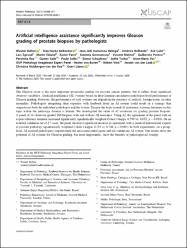Artificial intelligence assistance significantly improves Gleason grading of prostate biopsies by pathologists

Göster/
Erişim
info:eu-repo/semantics/openAccessAttribution 4.0 Internationalhttps://creativecommons.org/licenses/by/4.0/Tarih
2021Yazar
Bulten, WouterBalkenhol, Maschenka
Belinga, Jean-Joel Awoumou
Brilhante, Americo
Çakır, Aslı
Egevad, Lars
Eklund, Martin
Farre, Xavier
Geronatsiou, Katerina
Molinie, Vincent
Pereira, Guilherme
Roy, Paromita
Saile, Gunter
Salles, Paulo
Schaafsma, Ewout
Tschui, Joelle
Vos, Anne-Marie
van Boven, Hester
Vink, Robert
van der Laak, Jeroen
Hulsbergen-van der Kaa, Christina
Litjens, Geert
Üst veri
Tüm öğe kaydını gösterKünye
Bulten, W., Balkenhol, M., Belinga, Jean-Joel A., Brilhante, A., Çakır, A., Egevad, L. ... Litjens, G. (2021). Artificial intelligence assistance significantly improves Gleason grading of prostate biopsies by pathologists. Modern Pathology, 34(3), 660-671. https://dx.doi.org/10.1038/s41379-020-0640-yÖzet
The Gleason score is the most important prognostic marker for prostate cancer patients, but it suffers from significant observer variability. Artificial intelligence (AI) systems based on deep learning can achieve pathologist-level performance at Gleason grading. However, the performance of such systems can degrade in the presence of artifacts, foreign tissue, or other anomalies. Pathologists integrating their expertise with feedback from an AI system could result in a synergy that outperforms both the individual pathologist and the system. Despite the hype around AI assistance, existing literature on this topic within the pathology domain is limited. We investigated the value of AI assistance for grading prostate biopsies. A panel of 14 observers graded 160 biopsies with and without AI assistance. Using AI, the agreement of the panel with an expert reference standard increased significantly (quadratically weighted Cohen's kappa, 0.799 vs. 0.872;p = 0.019). On an external validation set of 87 cases, the panel showed a significant increase in agreement with a panel of international experts in prostate pathology (quadratically weighted Cohen's kappa, 0.733 vs. 0.786;p = 0.003). In both experiments, on a group-level, AI-assisted pathologists outperformed the unassisted pathologists and the standalone AI system. Our results show the potential of AI systems for Gleason grading, but more importantly, show the benefits of pathologist-AI synergy.
WoS Q Kategorisi
Q1Scopus Q Kategorisi
Q1Kaynak
Modern PathologyCilt
34Sayı
3Koleksiyonlar
- Makale Koleksiyonu [3777]
- PubMed İndeksli Yayınlar Koleksiyonu [4230]
- Scopus İndeksli Yayınlar Koleksiyonu [6574]
- WoS İndeksli Yayınlar Koleksiyonu [6631]


















